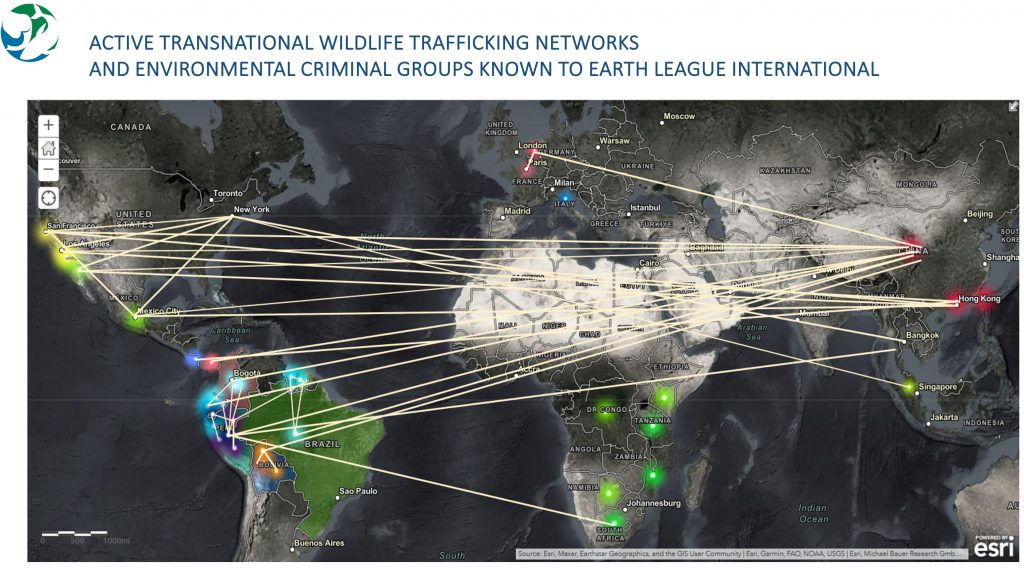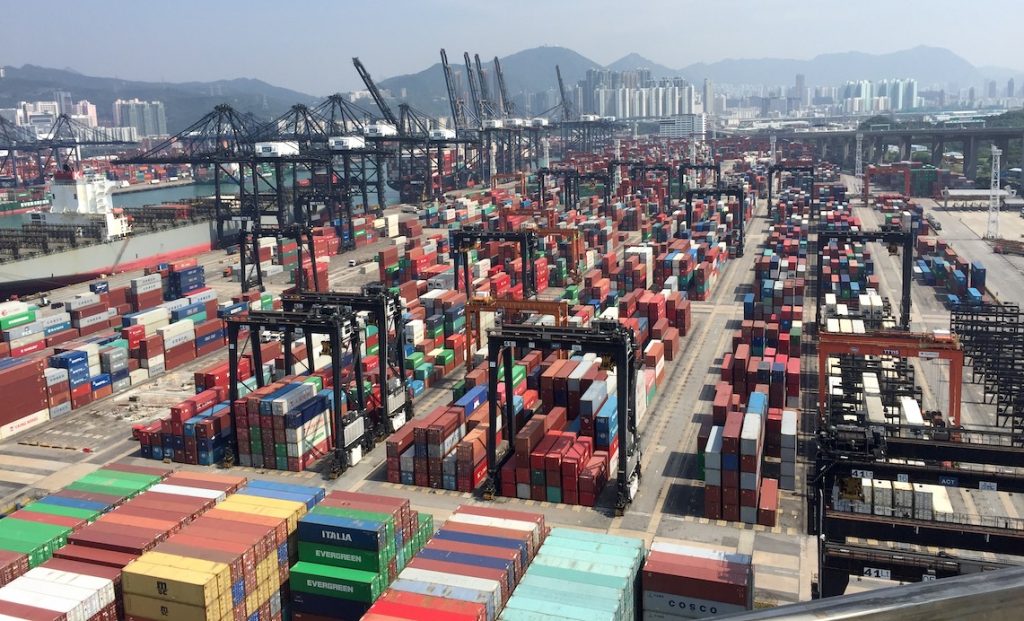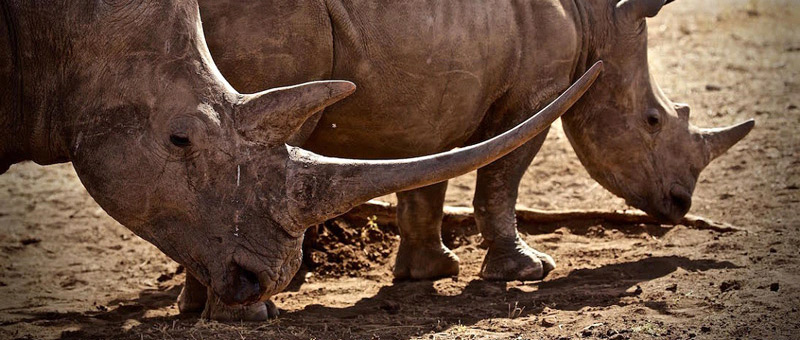THE CORE OF OUR WORK CENTERS AROUND FIELD INVESTIGATION, INTELLIGENCE-GATHERING, RESEARCH AND ANALYSIS, TARGETING INTERNATIONAL TRAFFICKERS AND TRANSNATIONAL CRIMINAL NETWORKS INVOLVED IN ENVIRONMENTAL CRIME AND OTHER SERIOUS CRIMES
THE AIM IS SUPPORTING THE WORK OF LAW ENFORCEMENT AND GOVERNMENT AGENCIES AND PROVIDING ACTIONABLE INTELLIGENCE TO VARIOUS STAKEHOLDERS, INCLUDING POLICY MAKERS, ACADEMIC INSTITUTIONS, MEDIA, AND THE PRIVATE SECTOR.
As pioneers in the use of professional intelligence applied to environmental crime and crime convergence, for over a decade, Earth League International (ELI) has been at the forefront of utilizing professional intelligence to combat environmental organized crime. With a proven history of success, ELI identifies and investigates the most important environmental criminals and transnational wildlife trafficking networks globally, including their links to Transnational Organized Crime.
We investigate and research various environmental crime-related issues, such as deforestation and land grabbing in the Amazon, illegal fishing, international trafficking of wildlife and marine products, illegal mining, and associated crimes like money laundering, corruption, drug trafficking, and human smuggling.
ELI comprises experienced multinational field investigators, undercover operators, researchers, crime analysts, geospatial, intelligence analysts, and highly skilled retired professionals from various U.S. law enforcement and intelligence agencies, all with extensive experience in executing projects worldwide, including former Federal Bureau of Investigations (FBI), National Geospatial-Intelligence Agency (NGA), and other U.S. government agencies.
“Our partnership with ELI is invaluable. Their access to these particular criminal networks is simply something we can’t do.”
Chris Egner, Special Agent at U.S. Homeland Security Investigations (HSI)

At the core of ELI’s work are long-term intelligence-gathering efforts, in-depth investigations, and undercover operations targeting transnational trafficking networks, organized environmental crime, and the convergence with other serious offenses such as money laundering, human smuggling, corruption, and drug trafficking. We target international traffickers, middlemen, organized crime and corrupt government officials. Our efforts unearth evidence and unveil previously undisclosed information regarding the criminal exploitation of nature.
We collaborate with various U.S. government agencies, including Homeland Security Investigations (HSI), US Fish & Wildlife Service, Department of the Interior, NOAA and other government agencies around the world, including in The Netherlands, Canada, and various countries in Latin America and South East Asia. We also collaborate with various academic institutions, including the John Jay College of Criminal Justice in New York and the Florida International University in Miami.
Due to security concerns and the sensitive nature of our work, along with our collaborations with various government agencies, over 50% of our operations are not made public. This confidentiality ensures the integrity and effectiveness of our missions.
Typically, our long-term intelligence-gathering operations last from one to five years and can be complex in terms of logistics, data collection and processing. To do so, we employ a team of multinational field operatives (including investigators and researchers), crime experts, and analytical support staff.

Fighting environmental organized crime is not just about awareness campaigns, funding and empowering rangers and local communities, or deploying the latest technology to remote areas.
Due to the complexity, international reach, and transnational organized criminal networks associated with environmental/wildlife crime, only professional intelligence can effectively shine a light on and thwart these crimes.
The intelligence-led approach is needed to integrate the more traditional “reactive” conservation models with a more proactive, impactful, and disruptive approach. Intelligence is the knowledge – ideally the foreknowledge – that our organization and partners must have to safeguard Earth and respond to very concrete threats to the environment and to us all.
Professional intelligence, especially HUMINT, or HUMan INTelligence, is essential to the detection, prevention, and prosecution of environmental crime and other related crimes, such as money laundering, corruption and the trafficking of other illegal products (Crime Convergence).
Intelligence Cycle and the Production of Actionable Intelligence
The collection and processing of information feed into our Intelligence Cycle. Equally important are analysis, reporting, and dissemination—a continuous process that begins with the collection of initial information and continues indefinitely.
Through processing and analysis, all gathered information from various sources is translated, evaluated for reliability, and assessed for relevance, ensuring it is usable and understandable for further analysis. Among other products, this work includes the production of Situational Reports (SITREPs), Target Profiles, and Confidential Intelligence Briefs (CIBs) for government and law enforcement agencies, as well as Public Reports for the public and policymakers.
The ultimate aim of gathering, processing, and analyzing information is to produce Actionable Intelligence that can be used in various ways—including arrests and prosecutions, launching new official investigations, visa interdictions, asset seizures, policy-making, and supporting further research by the private sector and academia.

OUR IMPACT
While ELI’s intelligence has played a crucial role in disrupting organized criminal networks, our impact is not measured solely by the number of arrests. Instead, we prioritize delivering relevant and significant intelligence to a wide range of stakeholders—including government agencies, policymakers, financial institutions, international organizations, and researchers—who are responsible for driving systemic change.
See our Impact Page for Key Indicators and Impact Tracking.

In Mexico and the U.S., our intelligence-gathering work on illegal fishing and the trafficking of totoaba and marine products, that is pushing the vaquita to extinction (Operation FAKE GOLD), helped Mexican and U.S. authorities to crack down on some important international traffickers, and, in May 2023, supported U.S. authorities in arresting some of the most important totoaba international traffickers, in Southern California.
In 2024, Operation OLD WORLD investigated an intricate trafficking network responsible for smuggling illegal wildlife products from China to Europe, largely intended for Traditional Chinese Medicine (TCM) purposes. This operation resulted in the delivery of a comprehensive Confidential Intelligence Brief (CIB) to the Dutch authorities, with detailed information about the trafficking networks’ operations, the main traffickers, their modus operandi, and convergence with other serious crimes. Leveraging the intelligence provided by ELI, the Intelligence and Investigation Service of the Food and Consumer Product Safety Authority (NVWA-IOD) was able to advance their investigation and arrest the head of the trafficking network based in Rotterdam.
Our investigative operations in China, Hong Kong and Vietnam (Operation GAME OVER and Operation RED CLOUD) informed the public and policymakers about the extent of the illegal trade in ivory and rhino horn, and also provided actionable intelligence to various international authorities. To date, these two operations remain the most comprehensive investigations ever conducted on the international trafficking of ivory and rhino horn. Operation GAME OVER was also featured in the Netflix documentary ‘The Ivory Game‘.
In Thailand, months of investigation by our team, allowed the Royal Thai Police and Customs to arrest two of the most important wildlife traffickers in Asia, who had been smuggling ivory, rhino horn, orangutans, pangolins and other illegal wildlife for years (Operation MOZART).

Independence and Integrity
In order to conduct intelligence-gathering operations and independent investigations effectively in certain countries, it is crucial that we maintain a distance by not establishing bases within these nations. This approach ensures that we can share or publish our findings and protect our organizational integrity without the risk of our offices and personnel becoming liabilities in the event of confrontations with entities under investigation.
Operating externally allows us to act without the threat of censorship, intimidation, or expulsion. As an independent agency, our primary role is to collect, assess, produce, and share actionable intelligence, ensuring that our contributions remain unbiased and impactful.
ELI does not always release media briefings in relation to our operations and the work of government partners, as doing so would jeopardize the safety of our teams in the field, law enforcement operations, and future investigations.



